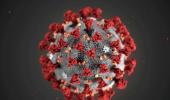IMD has said the temperature in April-June across most parts in India is expected to be 0.5-1 degrees Celsius warmer than normal.
However, doctors and scientists say they haven't found any direct correlation between the speed of Covid-19 spread and warm weather.
Sanjeeb Mukherjee reports.

If there is any inverse relation between the spread of Covid-19 and high temperature, India might be in for a better spot.
The official forecaster, India Meteorological Department (IMD), has said the temperature in April-June across most parts is expected to be 0.5-1 degrees Celsius warmer than normal.
The frequency of heatwaves is also likely to be slightly above normal in those three months.
The IMD says the higher warmth is expected over 'most of the subdivisions of northwest, west, central, east and western peninsular India'.
In the core heat wave (HW) zone, a 40 per cent probability of maximum temperatures during April to June being above normal.
This 'core heat wave zone' comprises Punjab, Himachal Pradesh, Uttarakhand, Delhi, Haryana, Rajasthan, Uttar Pradesh, Gujarat, Madhya Pradesh, Chhattisgarh, Bihar, Jharkhand, West Bengal, Odisha and Telangana, and the meteorological subdivisions of Marathwada, Madhya Maharashtra and Coastal Andhra Pradesh.
"This in turn suggests that slightly above normal frequency of heat wave conditions are likely in the core HW zone during the season," said the department.
It may be recalled that June 2019 was the hottest ever month recorded in India.
A March 26 report from PTI had said warm and humid weather is linked to slower spread of the novel coronavirus, according to a study which suggests Asian countries experiencing monsoon could see less transmission.
The scientists, including Qasim Bukhari from the Massachusetts Institute of Technology in the US, assessed data on the number of Covid-19 infections in different parts of the world. And, compared it with the temperature and humidity parameters from all the regions.
The report said the findings showed 90 per cent of the novel coronavirus, SARS-CoV-2, transmissions until March 22 had occurred in regions with a temperature between 3 and 17 degrees Celsius.
"These regions also had 4-9g per cubic metre (g/m3) of absolute humidity -- a measure of the amount of water vapour per cubic metre of atmosphere," the report said.
However, several doctors and scientists grappling with the global pandemic say they haven't found any direct correlation between the speed of spread of the disease and warm weather.
The PTI report said the study's conclusions were based on currently available data, with several unknowns. Which include how the virus is mutating, case fertility ratio, reproductive numbers and direct versus indirect transmissions.
It also emphasised that the results “in no way suggest the 2019-nCoV would not spread in warm humid regions”.
The study itself said effective public health interventions should be implemented across the world to slow down the transmission.











